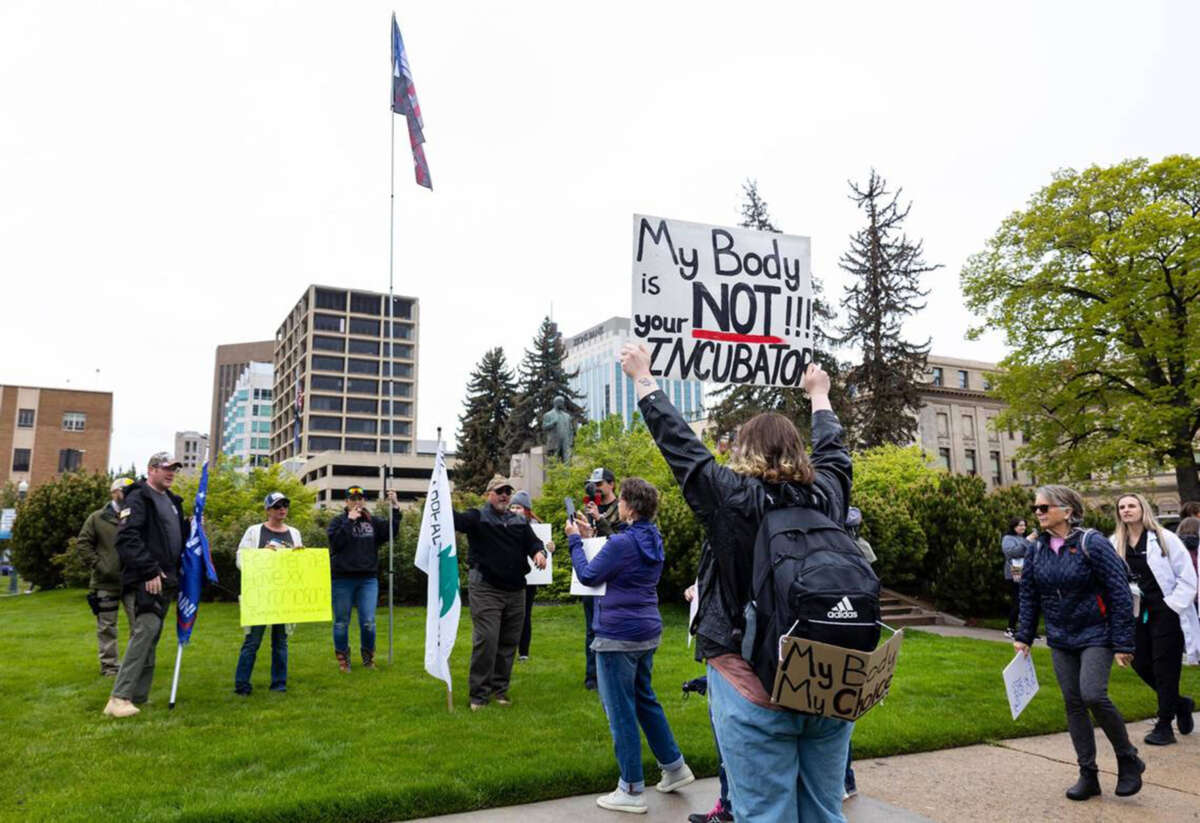Honest, paywall-free news is rare. Please support our boldly independent journalism with a donation of any size.
A coalition of attorneys general from nearly twenty states, led by Attorney General Bob Ferguson (D-Washington), filed a friend-of-the-court brief in support of several abortion rights organizations that are suing Idaho for its implementation of the country’s first “abortion trafficking” law.
Idaho has had an abortion ban in place since the U.S. Supreme Court overturned Roe v. Wade last summer. In 2023, the state narrowed the exceptions to the abortion ban, making it more difficult for pregnant people to access an abortion, even in cases of rape and incest. The law also includes a civil enforcement statute which allows family members of the pregnant person seeking an abortion to sue medical providers who perform abortions for $20,000 or more. Although the state’s abortion ban was challenged in court, the Idaho Supreme Court ruled to uphold the ban in January.
While doctors in the state can still technically perform abortions to save a pregnant person’s life under the law, they risk facing lawsuits with financial damages, the revocation of their medical licenses and potential felony charges.
“We have a death exception and that is it without any other guidelines,” Lauren Miller, a doctor specializing in maternal-fetal medicine and high-risk pregnancies, told CNN. “If I don’t act fast enough to save your life, prevent you from getting septic, I could be liable for civil cases … malpractice. But if I act too quickly and I’m not 100% certain that the patient is going to die from the complication she’s sustaining, then I could be guilty of a felony.”
In April, Idaho passed legislation criminalizing Idahoans who aid a pregnant minor in getting an abortion in another state — whether through medication or a procedure — with two to five years in prison. The travel ban was challenged in court in early July.
“Giving them [minors] money, giving them a ride, helping them organize the visit to a doctor out of state — all of the activity that’s required to help a young person leave the state — any of that would be punishable,” said Elisabeth Smith, director of U.S. state policy and advocacy at the Center for Reproductive Rights.
Before the legislation was signed into law by Idaho Gov. Brad Little (R), Washington Gov. Jay Inslee (D) sent Little a letter warning of the harmful effects the law would have on Idahoan youth. “This law places Idahoan youth in grave danger, and unlawfully infringes on every person’s First Amendment rights to free speech and to travel freely between states’ borders,” Inslee said in a statement.
Inslee has since signed a “shield law” making Washington a safe haven for abortion seekers, despite Idaho’s law. Under the law, Washington courts and law enforcement can’t aid criminal investigations or make arrests in abortion cases at the request of another state. A Planned Parenthood clinic in Pullman, Washington, saw a 16 percent increase in the number of patients coming from Idaho. In July 2022, 78 percent of that clinic’s patients were made up of Idahoans.
In the brief filed Monday, Washington Attorney General Bob Ferguson and attorneys general from 18 other states argued that Idaho’s law interferes with states that have less restrictive abortion policies and infringes on residents’ rights to interstate travel. The brief supports a legal challenge to the law filed by several advocacy groups suing Idaho, alleging that the law violates residents’ constitutional rights.
“The Constitution protects the individual right to travel between states, and Idaho’s radical Legislature cannot abolish that right,” Ferguson said in a statement. “Washington is standing up for the Constitution and reproductive freedom to support this challenge to Idaho’s unconstitutional abortion travel ban.”
Trump is silencing political dissent. We appeal for your support.
Progressive nonprofits are the latest target caught in Trump’s crosshairs. With the aim of eliminating political opposition, Trump and his sycophants are working to curb government funding, constrain private foundations, and even cut tax-exempt status from organizations he dislikes.
We’re concerned, because Truthout is not immune to such bad-faith attacks.
We can only resist Trump’s attacks by cultivating a strong base of support. The right-wing mediasphere is funded comfortably by billionaire owners and venture capitalist philanthropists. At Truthout, we have you.
Our fundraising campaign is over, but we fell a bit short and still need your help. Please take a meaningful action in the fight against authoritarianism: make a one-time or monthly donation to Truthout. If you have the means, please dig deep.
